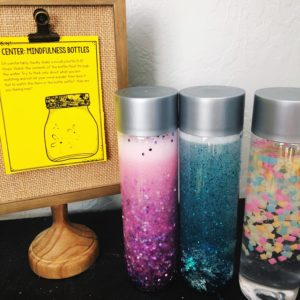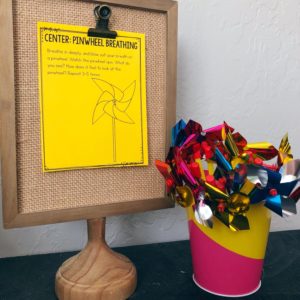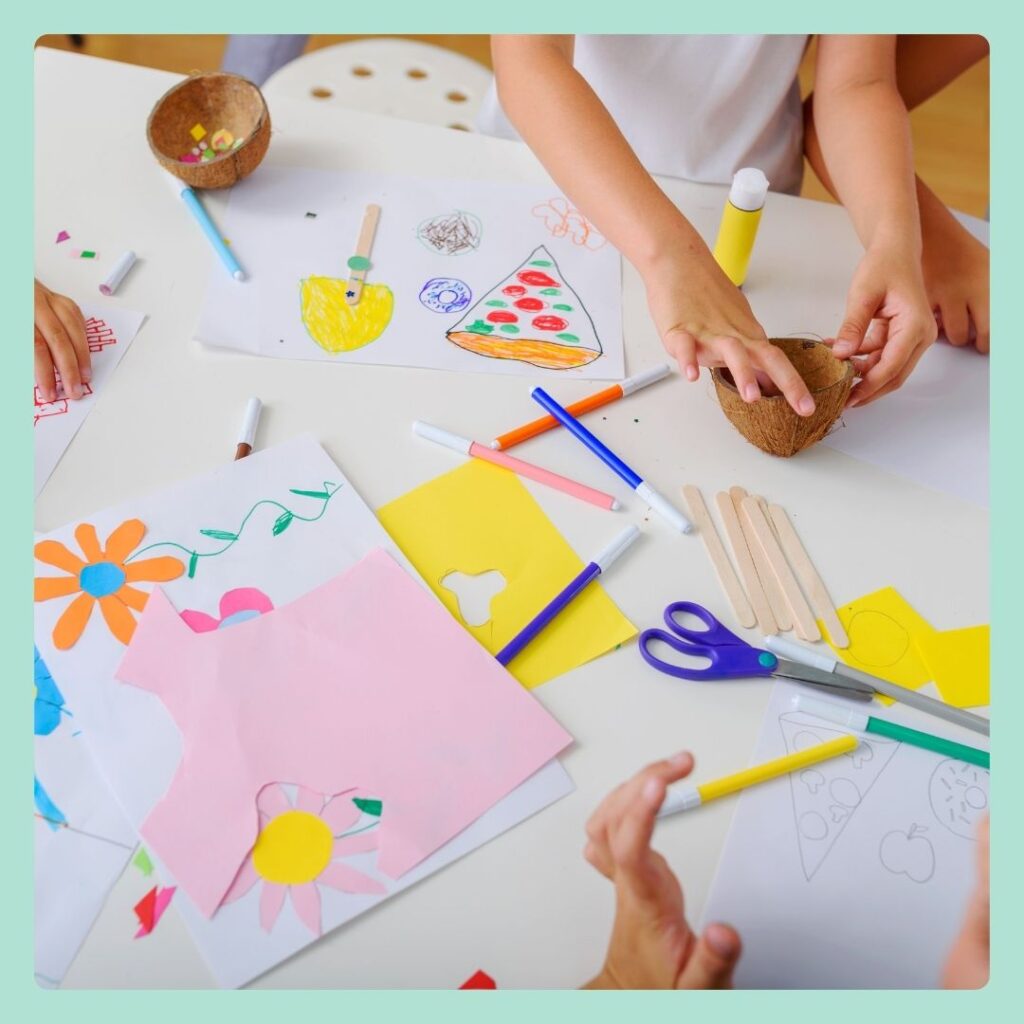I don’t know about you, but my counseling grad program didn’t spend a lot of time focusing on whole classroom instruction. I was ready for individual counseling. I was sooo ready for group counseling. But I was totally not ready to be standing in front of a group of 30 (a whole other issue…) students for a classroom guidance lesson! After some observation and reflection, I decided to add school counseling centers to my classroom guidance lineup. It worked well for me, and it can work well for you to transform your classroom guidance lessons and provide meaningful learning opportunities for your students!
School Counseling Centers
What Are They?
If you’re unfamiliar with centers, students are basically moving through learning stations with different activities during your counseling class period. For example, if you’re covering stress management, your students may visit centers about organizing and planning, reaching out to supports, exercising, etc. Each center is separated in the room so that students can focus on their particular station and also move logically through a sequence to the next center when it’s time to rotate.

Do What Works
When I first dove into classroom guidance, I needed something to create a comfort zone for this group-counseling-loving counselor. I paid attention to how teachers were managing their classrooms and what was working for them. Almost every teacher in my school was using centers very effectively. No need to reinvent the wheel, right? The students were already familiar with the set up, so it was easy to modify my content to fit the center format that was already in place in the classroom. Find a teacher in your setting who has great classroom management and an effective center set up, and model yours after that!
Setting Up Your School Counseling Centers
Your centers may look different depending on your class period or the frequency with which you see your students. For a 45 minute class period, try the following format: begin the lesson by doing a 5-10 minute mini lesson with a read-aloud or simple demonstration to introduce a topic or concept. Then students break out into smaller groups to explore activities related to your topic at centers. Students spend 5-10 minutes at each center depending on the number of activities. Finally, the lesson wraps up with a 5-10 minute debrief.
Here’s an example schedule for friendship centers:
- Warm up (read How to be a Friend): 5 min
- Review center details: 5 min
- Center 1 – Qualities I want in a friend: 5 min
- Center 2 – Qualities I bring to a friendship: 5 min
- Center 3 – What I like to do with friends: 5 min
- Center 4 – What friendship means to me: 5 min
- Center 5 – Friendship dilemmas: 5 min
- Debrief/wrap-up: 5-10 min

Cut the Chaos
Because students are largely on their own while using centers, there are plenty of opportunities for chaos. But with some preparation and pre-teaching, you can control the chaos and maximize engagement! Like I mentioned before, use a center format that your students are already familiar with. Then, spend time explicitly teaching the process anyway. Show your students exactly what they’ll be doing at each center and remind them what is expected during activities and during transitions. Use a clear signal to let students know when it’s time to move to a new center, and provide all of the necessary materials for each center so that students don’t have to move with supplies.

Why it Works
Centers can be an effective classroom management tool because every student is participating and moving. There are fewer opportunity for any one or small group of students to sink into the back and not participate. And students are engaged and learning because activities at centers are short, time-limited, hands-on, and highly focused. As your students rotate, you can spend time with smaller groups of students to reinforce concepts and build relationships. Your large group classroom guidance will be instantly transformed into a small group atmosphere!
Are you already using centers in your school counseling program? What works for you? Let us know in the comments! And if you’re not using them yet, check out this post for more information about setting up successful school counseling centers!











Hi Keri. You have such wonderful ideas and thank you so much for sharing. I am a big fan of centers for management and covering a topic from different angles. They are fun and engaging for students and add a little “flavor” to our lessons. I do have a question. Do you set up centers in the teacher’s classroom or do you have a big enough space to have students come to you for lessons? I have been blessed with the space for many years, but will be downsizing due to increased enrollment. I really want to use your ideas, but this will be a challenge in my reduced space.
Hey Gwen! Yes, I’ve always done them in the teachers’ rooms. I’m going to try to put together a video with some space-saving tips for storing centers, but basically, I had them in slender tubs that fit on my cart. I had one of those large, 2-tiered carts and I was able to carry my tub of center materials on the bottom. Inside the tub, I had each station for the center set separated in gallon sized zipper bags. I numbered all of the bags and all of the pieces inside the bag to make clean up easier in case anything got mixed up. So basically, 1 box friend friendship centers and inside the box 5 bags for the 5 different stations. I hope that helps!
Hello,
When you teach classroom guidance lessons do the teachers remain in the classroom? I ask because when I was in my masters program for school counseling we were taught that classroom guidance lessons were presented/taught when you visit the classroom and th teacher remained in the classroom.
Warm regards,
Jamie
Hi Jamie! In my experience, it depends on the school. In one school, teachers did remain the classroom when I visited for classroom guidance. In another, teachers met for their grade level PLC time, scheduled parent meetings, or did other tasks out of the room during guidance time. I of course prefer when they stay because it helps with carry-over, but it isn’t always possible.